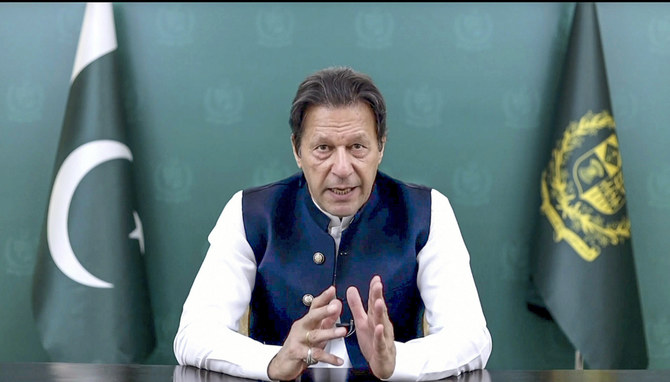ISLAMABAD: Prime Minister Imran Khan on Saturday asked the international community to stabilize and strengthen Afghanistan’s Taliban regime to preserve the gains made over the past two decades and prevent the war-torn country from becoming a safe haven of militant factions.
In a prerecorded speech delivered at the 76th United Nations General Assembly session, the Pakistani leaders touched upon a range of topics, including Islamophobia and the COVID-19 pandemic.
Focusing his attention on the current situation in Afghanistan, Khan said that about 90 percent of the people in that country were likely to fall below the poverty line by the next year, adding that such an economic implosion could have serious repercussions for everyone.
“There is only one way to go,” he said. “We must strengthen and stabilize the current [Taliban] government for the sake of the people of Afghanistan.”
The prime minister also maintained that a chaotic Afghanistan could once again become a sanctuary for global militant networks while pointing to the fact that such factions were the fundamental reason why the US invaded the war-battered country two decades ago.
He said the Taliban had promised to respect human rights, have an inclusive government and not allow their soil to be used by terrorists.
“If the world community incentivizes them, and encourages them to walk this talk, it will be a win-win situation for everyone,” he noted.
The prime minister said Pakistan had tremendously suffered after joining the US-led war on terror in 2001.
He said that his country lost 80,000 people and $150 billion for siding with the US.
“We were called collaborators [by the militants],” he said. “They declared jihad on us.”
Khan recalled that the US conducted 480 drone attacks on Pakistani soil which fueled militancy since such attacks were not always precise and resulted in significant collateral damage.
“People whose relatives had been killed sought revenge against Pakistan,” he said. “Between 2004 and 2014, there were 50 different militant groups attacking the State of Pakistan.”
“At one point,” he continued, “people like us were worried, that will we survive this? There were bombs going all over Pakistan. Our capital was like a fortress. Had it not been for one of the most disciplined armies in the world and one of the best intelligence agencies in the world, I think Pakistan would have gone down.”
STOLEN ASSETS
Discussing the flight of capital from poor nations to safe havens in developed countries, Khan said it was increasing the gap between the rich and the poor countries at an alarming speed.
He noted the UN secretary general’s high-level panel on Financial Accountability, Transparency and Integrity (FACTI) has calculated that a staggering seven trillion dollars in stolen assets were parked in the financial haven destinations.
The prime minister warned if the practice was not curbed, it would trigger a “mass exodus of economic migrants toward the richer nations.”
He said it was impossible to retrieve these stolen assets from the developed countries for poor nations, adding that the rich countries had no incentives or compulsion to return this wealth that belonged to the masses in the developing world.
“I foresee, in the not-too-distant future a time will come when the rich countries will be forced to build walls to keep out economic migrants from these poor countries,” he said.
Khan urged the UN to develop a comprehensive legal framework to halt and reverse the illicit financial flows to stop this “grave economic injustice.”
ISLAMOPHOBIA
The prime minister also discussed the issue of Islamophobia while highlighting New Delhi’s policies in Indian-administered Kashmir. He noted that terrorism had been associated with Islam among certain international quarters in the aftermath of the 9/11 attacks in the United States.
“This has increased the tendency of right-wing, xenophobic and violent nationalists, extremists and terrorist groups to target Muslims,” he said.
Khan urged the UN secretary general to convene a “global dialogue” to counter the rise of Islamophobia in the world.
“The worst and most pervasive form of Islamophobia now rules India,” he said, adding that the proponents of Hindutva ideology had unleashed a “reign of fear and violence” against India’s Muslim community of 200 million.
“It is unfortunate, very unfortunate, that the world’s approach to violations of human rights lacks even-handedness, and even is selective,” he said. “Geopolitical considerations, or corporate interests, commercial interests often compel major powers to overlook the transgressions of their affiliated countries.”
He said Pakistan wanted peace with its nuclear-armed neighbor India, but “the onus remains on India to create a conducive environment for meaningful and result-oriented engagement with Pakistan.”
“India’s military build-up, development of advanced nuclear weapons, and acquisition of destabilizing conventional capabilities, can erode mutual deterrence between the two countries,” he warned.
COVID-19 AND CLIMATE CHANGE
Speaking on the coronavirus pandemic, the prime minister said Pakistan had successfully contained the disease through a calibrated strategy of smart lockdowns that helped save the lives and livelihoods of its people and kept the national economy afloat.
He also described climate change as one of the primary existential threats to the planet while pointing out that his country’s contribution to global emissions was negligible, though it was still among the 10 most vulnerable places to the effects of climate change in the world.
Khan said Pakistan had embarked upon several “game-changing environmental programs” by planting 10 billion trees, preserving natural habitats and switching to renewable energy.
He urged the General Assembly to ensure vaccine equity, adequate financing for developing countries through debt restructuring to address the COVID-19 pandemic and climate change challenges.
“We must adopt clear investment strategies which help alleviate poverty, promote job creation, build sustainable infrastructure, and of course bridge the digital divide,” he added.












